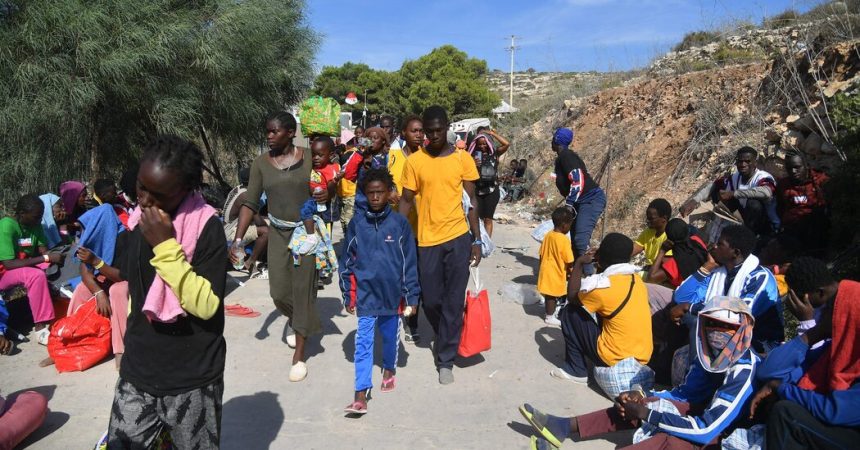On Italy’s southernmost island, Lampedusa, thousands of migrants crowded a reception center built for 600, as small boats hailing from Tunisia kept arriving. Outside Rome, a bus carrying migrants en route from Sicily to a center in the north crashed into a truck on Friday, killing the drivers of both vehicles and injuring 19 migrants.
The huge challenges posed by immigration were in the spotlight again in Italy this week, undermining the efforts of the far-right ruling coalition led by Prime Minister Giorgia Meloni to show that she had made progress in dissuading migrants from coming.
In the years leading up to her election last year, Ms. Meloni positioned herself as a hard-line opponent to migration, calling for a “naval blockade” and suggesting that the boats used to rescue migrants be sunk once the migrants were taken off them.
Since taking power, she has changed tactics, signing a European Union deal with Tunisia aimed at stemming the flow of migrants from that country, and working with the bloc to facilitate the redistribution of those who do arrive across member states.
The events of this week showed the limitations of that approach, leaving her in a quandary similar to that of previous Italian governments. Now, members of Ms. Meloni’s coalition are asking her to take a tougher approach and saying that Italy needs more support from other European countries.
“Europe is shockingly absent, far away, distracted, ignorant, deaf,” Matteo Salvini, the leader of the League party in the coalition said on Friday. “We will have to defend our borders on our own.”
The party’s deputy, Andrea Crippa, echoed those thoughts. “The diplomatic way led nowhere,” he said. “It is evident that the government of Tunisia has declared war against Italy.”
Most of the migrants landing in Italy this year set off across the Mediterranean from Tunisia, many in transit from other African countries. In July, in an agreement strongly supported by Ms. Meloni, the Tunisian government promised to tighten its sea borders and speed the returns of those who arrived illegally in Europe from Tunisia, in exchange for a hefty package of aid for its troubled economy. That money has yet to be disbursed.
Lampedusa, a rocky land mass surrounded by with turquoise waters and a population of about 6,000 people before the latest migrant surge, is 70 miles north of Tunisia and 130 miles south of Sicily. It has been the main destination for the growing numbers of migrants coming from Tunisia.
Some islanders worry that growing migrant arrivals could hurt the tourism industry, but many express empathy for the people landing on their shores.
“Everyone in Lampedusa feels for the migrants,” said Pietro Riso, 64, a fisherman who said he had participated in rescues at sea of migrants alongside his brother.
They had also been witnesses to tragedy, said his brother, Vincenzo Riso, 56. “We have seen migrants’ coffins for decades here,” he said.
With the rising migrant arrivals, Lampedusa has become a focus of increasing tensions between Italy and North Africa, as well as with its European neighbors.
France has announced stricter checks at its borders to stop migrants who landed in Italy from making their way north. Germany has suspended its acceptance of asylum-seekers under the European Union’s “voluntary solidarity mechanism,” saying that Italy has not been taking back migrants who initially arrived there and, under European rules, are Rome’s responsibility.
“I partly expected it,” Ms. Meloni said on Wednesday of the decisions by France and Germany, explaining that Italy stopped taking back those migrants because its facilities were “full” and Europe does not help “defend our external borders.”
The main priority for Europe, she said, should be trying to stop arrivals of migrants in Italy.
About 126,000 migrants have landed in Italy so far this year, more than twice the number who arrived in 2022. Officials say that roughly 70 percent first landed in Lampedusa.
Traffickers in Tunisia have been using small, rickety boats cobbled together from metal sheets to maximize the number of people motoring toward Italy — a perilous undertaking across the Mediterranean. On a recent visit to Lampedusa, several of the boats, battered by the sea and falling apart, could be seen in the port.
The authorities say they get dozens of distress calls from sinking craft carrying migrants at the same time, and also have their hands full tracking migrants who do reach Lampedusa’s port or beaches.
As more than 100 small boats reached Lampedusa this past Tuesday, the population of the reception center on the island swelled to over 6,000 migrants, including children as young as a few months old waiting to leave for more permanent destinations in Italy.
On Friday morning, 3,800 migrants were still living in the camp, according to the authorities.
Usually, Italian coast guard boats rescue migrants miles from the coast and bring them to a dock accessible only to doctors, police officers and officials. Later, migrants are taken by bus to the fence-enclosed reception camp inside a narrow canyon, isolated from the town. Once the authorities determine the migrants’ next destination in Italy, they are moved by ferry or plane to the mainland.
As the numbers have boomed, however, that system has collapsed.
Exasperated migrants have been pressing to be transferred more quickly, and videos on social media show scuffles and tension inside the camp. Some of the footage showed people crowding the iron gate at the entrance, trying to break out as the police were stationed outside.
Earlier this week, a group of young migrants climbed over the fence of the reception camp and showed up at the home of a local family, asking for food. The homeowner, a firefighter in Lampedusa, posted a picture of their dinner with a plate of spaghetti.
The bus crash on Friday, in which the two drivers were killed, also underlined for many Italians the growing crisis over migrants. The bus had been transporting 48 migrants, who had first landed in Lampedusa, to the northern region of Piedmont. Nineteen of the migrants were treated for light wounds on Friday.
Francesca Basile, who is in charge of immigration for the Italian Red Cross, said during an impromptu news conference outside the center in Lampedusa on Friday that the authorities hoped to transfer 2,500 people that day from the island.
She said that the situation inside the camp has been tense in the past few days, because of the large number of migrants, but was “never out of control.”
“Arrivals are diminishing now,” Ms. Basile said. “The situation is gradually becoming less complex to manage.”
Flavio Di Giacomo, a spokesman for the International Organization for Migration, said the main problem for Italy was processing so many in people on a small island.
“The numbers are high, but the main hurdle is that they mostly get to Lampedusa, which is tiny, not the overall number for a big country like Italy,” he added. “The difference from past years is their route, where they depart from, and where it logistically makes more sense for them to get to.”
Some politicians have been pressing the government to deploy the Navy to pick up migrants at sea to ease the island’s burden.
Ms. Meloni has rejected that idea in the past.
“It only makes us waste million and million of euros to send our military Navy to work as a ferry to pick up migrants,” Ms. Meloni has said.








![[Goals Highlight] Barcelona 5 – 0 Real Betis (Watch Here) [Goals Highlight] Barcelona 5 – 0 Real Betis (Watch Here)](https://worldhours24.com/wp-content/uploads/2023/09/header-16-150x150.jpg)
